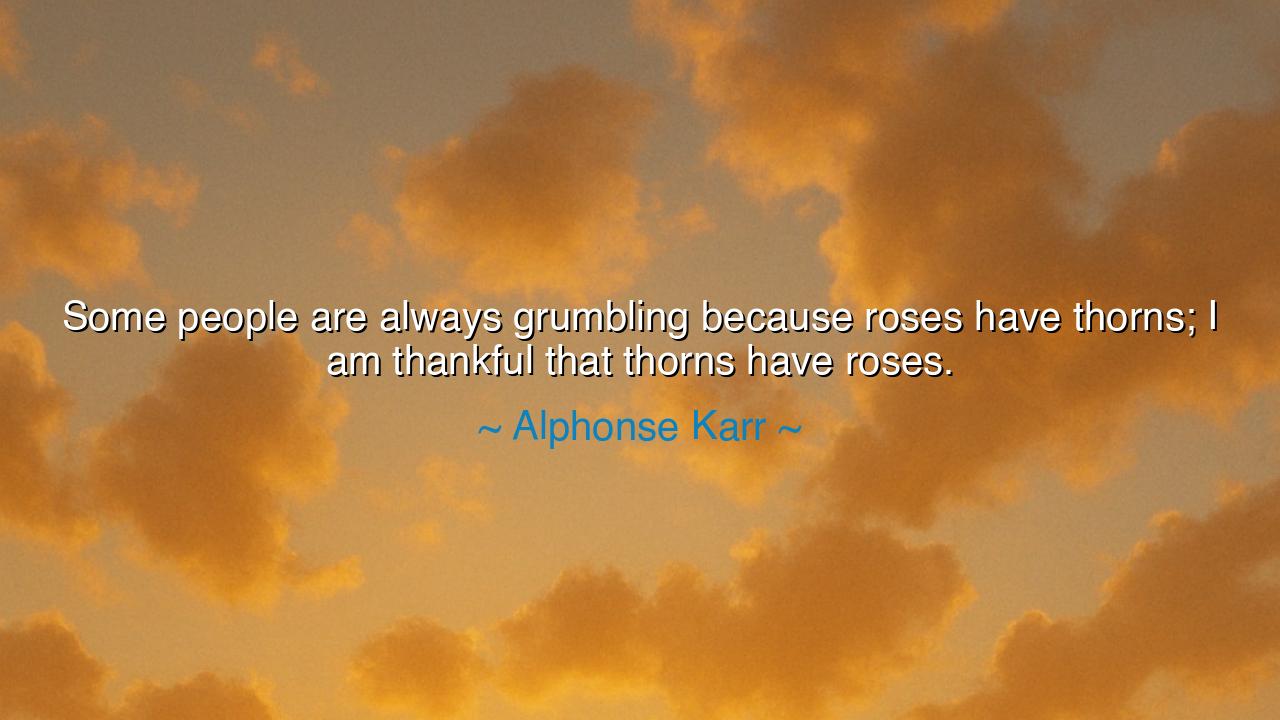
Some people are always grumbling because roses have thorns; I am
Some people are always grumbling because roses have thorns; I am thankful that thorns have roses.






Hear now, child of time, the wisdom that has crossed centuries, whispered by the pen of Alphonse Karr: "Some people are always grumbling because roses have thorns; I am thankful that thorns have roses." At first glance, these words may seem but a play of wit, a clever reversal of phrase. Yet hidden within them lies a vision of life itself—whether one chooses to dwell on pain or beauty, on hardship or gift. The rose, radiant and fragrant, stands as the symbol of all that is precious in this world, while the thorn speaks of trial, resistance, and the small sufferings that guard what is truly worth cherishing.
The ancients often taught that life is neither wholly sweet nor wholly bitter. The wine of the gods was pressed from grapes bruised underfoot, and so joy emerges from struggle. The rose with its thorn is no accident, but nature’s decree: beauty is never given without its price, and safety is never granted without its cost. The wise man does not curse the thorn for piercing his hand; he marvels that amidst its sharp defenses blooms a treasure so fragrant. Thus Karr’s words are not only poetic, but prophetic: they reveal to us the power of gratitude over complaint, of vision over blindness.
Consider, then, how often men and women turn their gaze upon what wounds them, forgetting what blesses them. A worker laments the toil of his labor, yet forgets the bread it places upon his table. A soldier remembers the weight of armor, yet not the protection it affords in battle. Even in love, many bewail the quarrels and hardships, while failing to rejoice in the moments of tenderness and devotion that accompany them. In truth, the one who fixes his eyes only upon the thorn will never know the sweetness of the rose; but the one who sees the rose, even while bleeding, walks with joy.
History too gives us witnesses to this wisdom. Recall the story of Helen Keller, who, though struck with blindness and deafness from infancy, learned to rejoice not in what was taken from her, but in what remained. With the help of her teacher, Anne Sullivan, she discovered the world through touch and thought, and became a voice for the voiceless. Many would have cursed their lot, groaning at the thorns of such affliction. Yet she saw the roses: the power of learning, the triumph of the human spirit, the ability to inspire millions. Her life is the living embodiment of Karr’s teaching, that the thorn, though sharp, is crowned with a bloom.
Let us also remember the warriors of old, who, though enduring hardship and sacrifice, bore their suffering with pride because it was yoked to a noble cause. The Spartan at Thermopylae did not curse the thorns of hunger, pain, and certain death; instead, he gloried that he might defend his land and leave behind a fragrance of honor for his descendants. The thorn of suffering was the price of the rose of freedom. Thus, even in the dust of battle, the proverb holds true: gratitude transforms the sting into glory.
The lesson is clear: life will always bear both roses and thorns. It is not given to us to choose whether we shall face hardship, but it is given to us to choose our sight. Shall we see only what cuts, or shall we rejoice in what blossoms? To complain is to chain the soul in bitterness; to give thanks is to set the spirit soaring. Gratitude does not remove the thorn, but it crowns it with meaning, and turns suffering into strength.
What, then, should one do? First, in every trial, pause and ask: “What rose is hidden among these thorns?” When you lose something, search for what has been gained. When wounded by betrayal, look for the wisdom and resilience it brings. Second, practice daily gratitude, naming aloud the roses that bless your life, until your heart grows accustomed to joy. Third, when you behold beauty, remember it is all the more precious because it is fragile and guarded—love it fiercely, even if it pricks your hand.
Thus, children of the future, take this teaching as a lamp in the darkness: be not among those who forever grumble at the thorns, but among those who rejoice that thorns bear roses. For in the end, it is not the thorn that defines the rose, but the rose that redeems the thorn. And he who learns to see thus shall walk this earth not in complaint, but in thanksgiving—and his life shall bloom with a fragrance that endures beyond the grave.






AAdministratorAdministrator
Welcome, honored guests. Please leave a comment, we will respond soon